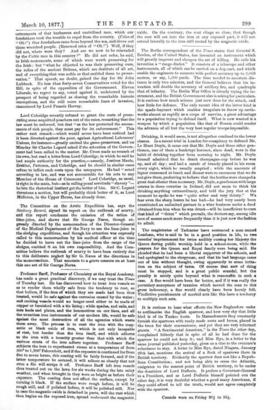, Professor Barff, Professor of Chemistry at the Royal Academy, has
made a great practical discovery, if we may trust the Times -of Tuesday last. He has discovered how to treat iron vessels so as to render them wholly safe from the tendency to rust, so that boilers, if the iron of Which they are made had been thus treated, would be safe against the corrosion caused by the Water; and cooking vessels would no longer need either to be made of copper or furnished with a tin lining ; while spades, and rails, and iron keels and plates, and the locomotives on our lines, and all the countless iron instruments of our modern life, would be safe- against the most destructive of all the agencies which waste them away. The process is to coat the iron with the mag- netio or black oxide of iron, which is not only incapable of mast, but harder than the iron itself, and which adheres to the iron with a tenacity greater than that with which the ieleiouts strata of the iron adhere together. Professor Baeff subjects the iron to superheated steam at a temperature of from 500° to 1,200° Fahrenheit, and if the etposure ia continued for from five to seven hours, this coating will be fairly formed, and if the hitter temperature be seemed, it will adhere so closely that not even a file will scrape it off. Professor Baer left iron vessels thue treated out on the lawn for six Weeks during the late rainy weather, and when brought in they were as bright as before their exposure. The coating does not affect the surface, except by turning it black. If the surface were rough before, it will be tough still, and if polished before, it will be polished still. Nor in case the magnetic oxide is detached in parts, will the rtst which then begins on the exposed iron, spread underneath the magnetic
oxide. On the contrary, the coat clings so close, that though the rust will eat into the iron at any exposed part, it will not extend laterally to the iron still coated by the magnetic oxide.


































 Previous page
Previous page